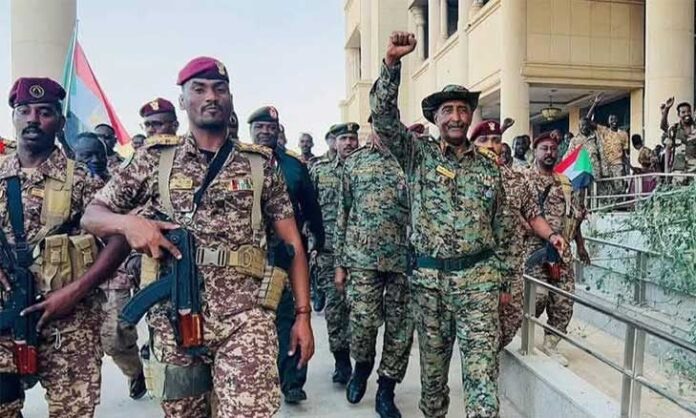Residents reported that the Sudanese army has expelled the Rapid Support Forces from most parts of Khartoum, while army commander Abdel Fattah al-Burhan toured the presidential palace and airport, representing a military gain although the wider war seems far from over.
Sudanese army chief Abdel Fattah al-Burhan declared Khartoum “liberated” from the presidential palace, which he reached after his soldiers recaptured the capital’s airport from the Rapid Support Forces.
In a live statement broadcast on Sudan TV on Wednesday (March 26, 2025), al-Burhan said, “Khartoum is free and it’s over,” after the Sudanese Armed Forces managed to drive out the Rapid Support Forces from the capital.
An army statement indicated that al-Burhan’s plane, which arrived at the airport, was the first to land there since the war broke out in April 2023. The army also stated that it had taken control of a major Rapid Support Forces base south of the capital, noting that it was the paramilitary group’s last major stronghold in Khartoum state.
The army released drone footage showing dozens of people walking on a dam, which it claimed showed Rapid Support Forces withdrawing across the Nile2. Reuters could not confirm that the footage showed Rapid Support Forces, who have not yet commented on today’s military developments.
Earlier, army spokesman Nabil Abdullah told AFP that army forces “have recaptured the airport and it has been fully secured” after two years of Rapid Support Forces being stationed inside it. These developments come as part of a large-scale army operation aimed at tightening control over the capital.

Other Challenges After Retaking Khartoum
A military source told AFP that the Sudanese army is encircling the Jebel Awliya area south of the capital from the north, south, and east, which is the last major stronghold of the Rapid Support Forces (RSF) in the Khartoum region.
Earlier this week, the army announced its control over key sites, including the Republican Palace, the Central Bank, and the headquarters of National Intelligence Services.
On Wednesday, according to the same source, the army surrounded Manshiya Bridge from both sides. This bridge spans the Blue Nile east of Khartoum, leaving Jebel Awliya Bridge southwest of the capital as RSF’s final exit route from their controlled areas. The source stated that “remnants of RSF militia are now fleeing via Jebel Awliya Bridge.”
While the army has made significant advances in central Sudan by reclaiming neighborhoods in Khartoum and other areas, RSF forces have strengthened their control in western Sudan. This intensifies clashes and raises concerns about potentially dividing the country.
“Deep Shock”
This progress comes a day after monitoring groups and RSF accused the army of carrying out an airstrike described as one of the deadliest attacks in the war. Witnesses reported that at least 270 people were killed in a market in Darfur.
UN High Commissioner for Human Rights Volker Türk expressed “deep shock” over reports of hundreds of civilian casualties from these airstrikes. Türk reminded that “indiscriminate attacks on civilians and civilian objects are unacceptable and may amount to war crimes.”
RSF forces remain stationed in Jebel Awliya and areas south and west of Omdurman within Greater Khartoum.
Since the war began, both sides have been accused of committing violations against civilians and indiscriminately targeting residential neighborhoods. RSF forces specifically face allegations of systematic looting, sexual violence, and seizing citizens’ homes and properties.
The United States has imposed economic sanctions on army chief Abdel Fattah al-Burhan and his former deputy, RSF leader Mohamed Hamdan Dagalo (Hemeti), due to violations committed by their forces during the war. Hemeti is particularly accused of orchestrating massacres in Darfur.
Since April 2023, tens of thousands of Sudanese have been killed, and over 12 million displaced, causing one of the world’s largest crises of displacement and hunger. The war has divided Sudan into regions controlled by the army in the north and east, while RSF dominates most of Darfur in western Sudan and parts of the south.
The Alliance that Ignited the War
The war, which has resulted in loss of life and an unprecedented humanitarian crisis, came after the Sudanese army and the Rapid Support Forces (RSF) collaborated in 2021 to overthrow a civilian leadership formed following the fall of former President Omar al-Bashir in 2019.
During al-Bashir’s era, both sides fought on the same front in Darfur, western Sudan.
Al-Bashir formed the RSF, which has its roots in the Janjaweed militia in Darfur, under the leadership of Mohamed Hamdan Dagalo, known as Hemedti, to become a parallel force to the army led by al-Burhan.
After seizing power in 2021, a dispute arose between the army and the RSF over an internationally-backed plan aimed at implementing a new transitional phase led by civilian parties, during which both sides would relinquish their powers.
The main points of contention included a timeline for integrating the RSF into the armed forces, the command hierarchy between their leaders and army commanders, and the issue of civilian oversight.
The Sudanese army had better resources when the war broke out, including air power. Nevertheless, the RSF was more entrenched in Khartoum’s neighborhoods and managed to control a large part of the capital at the beginning of the conflict. The RSF also advanced in Darfur, its main stronghold, and Gezira state south of Khartoum, a vast agricultural region.
(AFP, Reuters, DPA)


